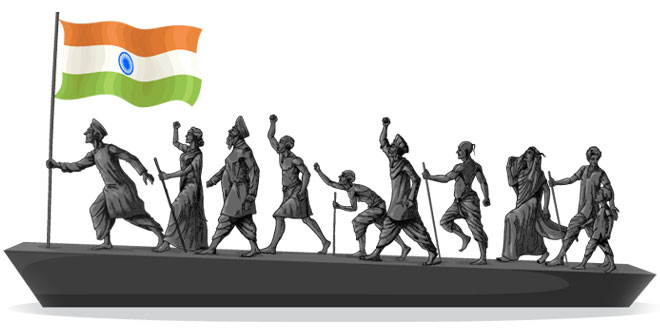Question: What factors resulted in growing opposition to British rule?
Answer: All these factors resulted in growing opposition to British rule:
- All the section of society suffered under British rule.
- The peasant had to pay high taxes.
- The artisan was ruined by foreign competition.
- The factory worker received very low wages.
- The British made no attempt to encourage agriculture and industry.
- They treated India as a source from where raw materials could be obtained cheaply and as a market which could absorb British goods.
- Employment opportunities for the educated Indians were limited.
- India was made to play for the upkeep of the British army and for the wars that Britain fought.
- The steady drain of Indian’s wealth increased poverty in India.
- The attitude of superiority adopted by the British was also disliked.
Question: Why did the British introduce modern education in India?
Answer: The British had introduced modern western education to prepare some Indians to work at low posts in the administration. The British also believed that if Indians were exposed to western thoughts and ideas, they would become supporters of British rule in India. The British expected that since educated Indians would be dependent on them for employment, they would always remain loyal to them.
Question: Who were the Moderates? Why were they called so? Write any three demands of the Moderates.
Answer: During the first 20 years of the Congress, the moderate nationalists of Moderates dominated the party. Surendranath Banerjea, Dinshaw Wacha, Pherozeshah Mehta and Gopal Krishna Gokhale were some important moderate leaders. They were ‘moderate’ in their objectives and methods. They believed in constitutional methods and in methods of persuasion. They were demands were:
- Freedom of speech and expression
- Expansion of welfare programmes
- Promotion of education
- Recruitment of Indians to high posts in the administration
- More powers for the Legislative Councils and more Indian members in these Councils.
Question: Write the main features of the Morley-Minto Reforms.
Answer: To pacify the moderate leaders, the government announced the Indian Councils Act, popularly known as the Morley-Minto Reforms. Its main feature were as follows.
- More members were to be inducted into the Central Legislative Council and the Provincial Legislative Councils.
- They system of separate electorates was introduced. The Muslims were grouped into separate constituencies from where only Muslim candidates could contest elections. This was done to pacify the leaders of the Muslim League, which had been formed a few years earlier.
Question: What was the Ilbert Bill controversy?
Answer: In 1883, Lord Ripon’s law member, Sir Ilbert, introduced a bill which later came to be known as the Ilbert Bill. It had a provision which gave Indian judges the power to try cases involving Europeans. Immediately, the whole European community started an agitation opposing the bill. These protests forced the government to withdraw the bill. To the Indians it was a proof that they could never expect equality from the British government.
 Class Notes NCERT Solutions for CBSE Students
Class Notes NCERT Solutions for CBSE Students



Pura book hi chap thya hai
Sala fake
Please don’t paste the nude advertising. Many times complained for this. But no solutions….
The advertisements are provided by Google depending on cookies or last search made on your computer or smartphone. Please clean your cache, these will stop appearing. It’s not our hand. – Admin